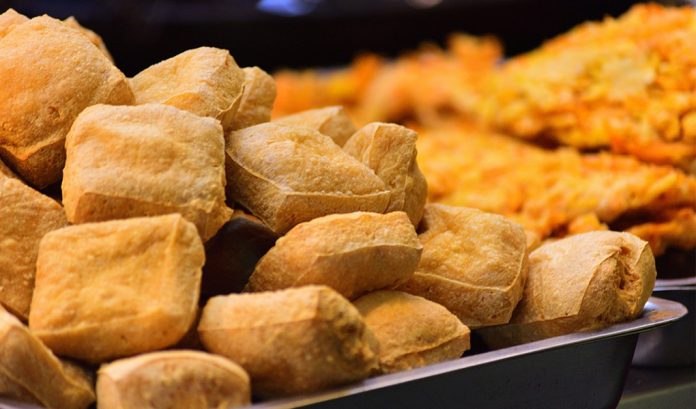
(DoctorFarrah)- Contrary to the long-accepted belief of scientists and researchers that soy or tofu prevent breast cancer, a group of researchers found out that soy actually speeds up the growth of breast cancer cells instead of retarding their growth.
The landmark study was conducted by researchers at the Memorial Sloan Kettering Cancer Center in New York who were experimenting on the value of soy in reducing breast cancer. They are now warning women that eating soy and adding it to their daily diet will accelerate the rate by which breast cancer cells spread.
Traditional Uses of Protein
The Chinese, large consumers of soy, were known not to eat unfermented soybeans, compared to other legumes such as lentils, because they believe soybeans contain abundant quantities of natural toxins (antinutrients). Leading these natural toxins were powerful enzyme inhibitors that prevent the action of trypsin and other enzymes needed for protein digestion.
These inhibitors are large, tightly folded proteins that are not completely deactivated during ordinary cooking. They can produce serious gastric distress, reduced protein digestion, and chronic deficiencies in amino acid uptake. In test animals, diets high in trypsin inhibitors cause the enlargement and pathological conditions of the pancreas, including cancer.
The Sloan Kettering Study
Researchers at the Memorial Sloan Kettering Cancer Center compared tumor tissues from before and after a 30-day program of eating a soy supplement while a control group took a placebo. The study found changes in the expressions of certain genes largely known to promote cancerous cell growth among the women consuming the soy supplement.
The findings led them to conclude the soy protein could potentially speed up the advancement of the disease. The study states: ‘These data raise concern that soy may exert a stimulating effect on breast cancer in a sub-set of women.’
The Risks of Soy Consumption
This new study could put thousands of women who traditionally consume soy and those who are eating it now due to health & fitness beliefs that it protects them against breast cancer in very grave danger.
This is not the first time that soybeans have been linked to breast cancer cell malignancies. In 1996, scientists discovered that women who eat soy protein isolate had a higher risk of epithelial hyperplasia, a condition that is pre-cancerous. A year after, dietary genistein was discovered to stimulate breast cells to start the cell cycle – a finding that led the study’s authors to conclude that women should not eat soy products to prevent breast cancer.
Kaayla T. Daniel, author of the book, The Whole Soy Story: The Dark Side of America’s Favorite Health Food, said, “It’s a myth that soy prevents breast cancer. Numerous studies show that soy can cause, contribute to, or even accelerate the growth of cancer.”
Those who participated in the soy study took quite recent breast biopsies – and were diagnosed with stage 1 or stage 2 breast cancer. A lumpectomy or mastectomy is scheduled for them two to three weeks later. The researchers said they don’t know if the effects can be reversed.
Who Are at Risk?
Of those who participated in the soy study who are at risk of breast cancer, it was found out that those women who experienced changes in a certain set of genes are those who drank around 51.6 grams of soy or about four cups of soy milk a day.
That means most people drinking soy in Asian countries and eat a lot of tofu and soy in their diets are traditionally susceptible to the adverse effects of soy. The surprising fact about this is that in 1998, a survey revealed that the average Japanese soy eater consumed about 8 g. of soy for men and 7 g. for women – less than two teaspoons a day. Americans are eating more soy than this now.
The Risks of Eating Soy
Currently, any soybean or soybean-derived food product now has a 93% chance of having GMO content. In other words, soy is a dangerous food crop. Even if the soy is organic, it does not change the toxicity of unfermented soy which are everywhere in the food supply now.
Majority of soy now is unfermented – and that is where the danger resides. Phytates in unfermented soy actually block the absorption of protein and four other key minerals – magnesium, iron, calcium, and zinc than fermented soy. In their natural form, soybeans carry phytochemicals with toxic effects on the human body. These three identified anti-nutrients are goitrogens, phytates, and enzyme inhibitors. These anti-nutrients are the immune system of the plant, protecting the plant from the invasion of bacteria, exposure to the sun’s radiation, and animals who eat them.
If the soybeans are not soaked or fermented, one can get really sick from soy’s toxins.
Unfermented soy has been traced to allergies, higher risk of cancer and heart disease, endometriosis, reproductive problems for men and women, digestive distress, immune system breakdown, PMS, ADD and ADHD, malnutrition, and loss of libido.
Copyright 2025, DoctorFarrah.com








